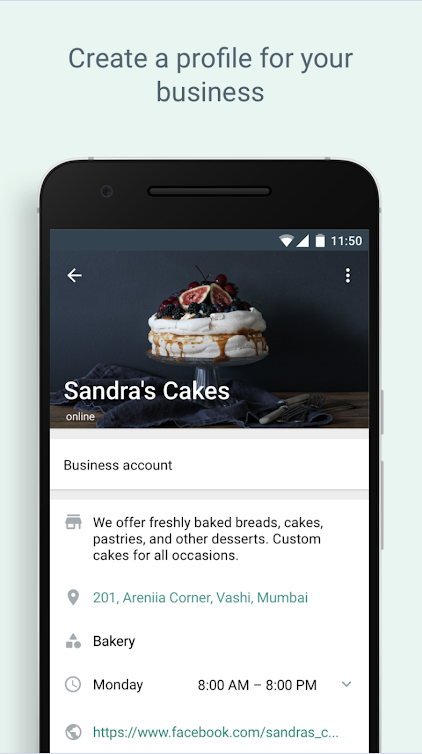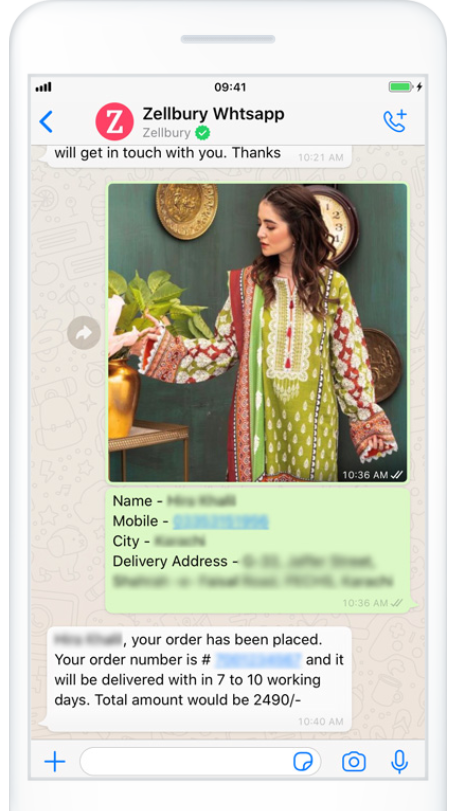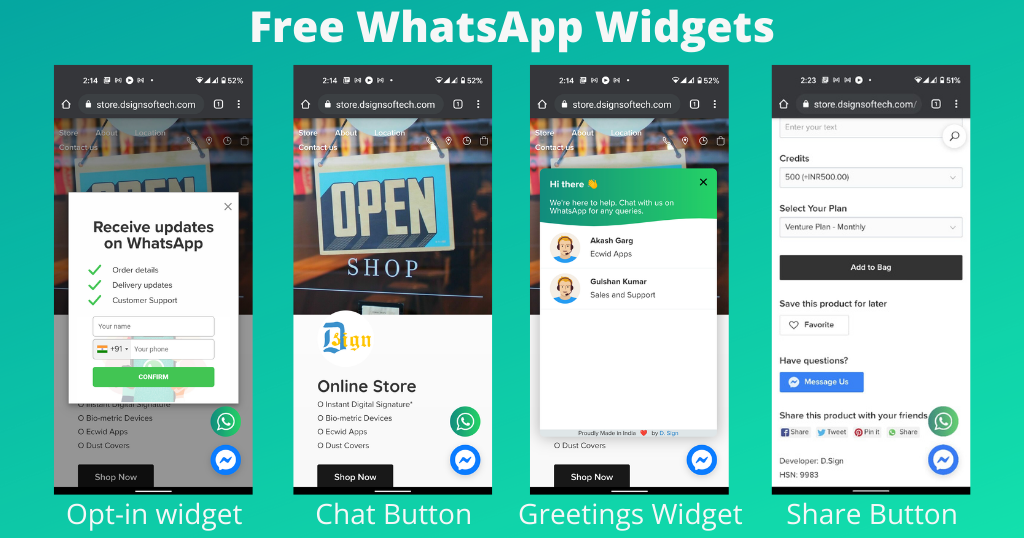WhatsApp is one of the most popular messaging platforms on the Internet. Though it’s owned by Facebook, it has achieved international popularity in its own right. In addition to being a great option for
In this article, we’ll break down how you can use WhatsApp for your
In this post:
- What Is WhatsApp Business?
- Pros of WhatsApp Business
- Limitations to WhatsApp Business
- How to Set Up WhatsApp Business
- WhatsApp for
E-Commerce Strategies
What Is WhatsApp Business?
Launched all the way back in 2009, WhatsApp is by far the most popular mobile messenger app in the world, with over two billion monthly active users.
It’s available in more than 180 countries and 60 different languages.
All that traffic presents a stellar opportunity for businesses — especially small businesses and
In January 2018, WhatsApp launched a variant of the app called WhatsApp Business, meant for business owners looking to capitalize on WhatsApp’s remarkable popularity and usage.
“We’re excited that we’ve helped millions of businesses grow. For example, in India,
What does all this mean for you? Mostly that WhatsApp Business is a
Before we dive into the
Pros of WhatsApp Business
Aside from WhatsApp’s colossal popularity for chatting with friends and family members, your customers are likely also interacting with business accounts like yours. Here are a few advantages of using the business version of the app for your
- Display your catalog: There’s a section in your business profile where you can showcase your products and/or services along with brief info, such as prices, photos, and a link to the product card on your website.

- Save time with preset responses: The platform lets you create predetermined messages to answer some of your customers’ FAQs. Simply press “/” to select a quick reply and send.

- Segment your customers: You can organize your contacts or chats with labels for easy retrieval. Plus, you can easily manage your chats with filters to sort by unread messages, groups, or broadcast lists.

- Build distribution lists: WhatsApp Business allows you to create broadcast lists to distribute the same message to many users in one go.
- Get stats: WhatsApp also generates reports for basic metrics like the number of messages sent, delivered, and read, which can also aid your understanding of customer behavior and analytics.
You can engage even more with your customers by sending them a Greeting message as an introductory welcome when they first reach out. And for time when you are away from your phone, use Away messages to indicate when you’ll return and respond to messages.
Limitations to WhatsApp Business
As with any marketing channel (or just about anything in life), there’s room for improvement. Here are a couple of cons to WhatsApp Business:
- Extremely basic automation: As mentioned, you can set a welcome and away message, which is helpful. However, if you’d like to integrate a chatbot for advanced functionalities (such as personalized product recommendations, abandoned cart recovery, etc.), you’ll need to obtain the WhatsApp Business API (which is geared more towards larger businesses). Good news for Ecwid merchants: you can easily set up WhatsApp bot with the WhatsApp Plugin from Ecwid App Market.
- A separate number needed: To use WhatsApp Business, you must have a separate phone number available (or be willing to turn your personal WhatsApp user account into a business account) as each app requires a unique phone number — a potential hurdle if you were planning to grant access to other members of your team.
That being said, these limitations are minimal compared to the benefits of Whatsapp for your business. And considering that the platform is free to use, and empowers you to connect with customers on their terms, there’s no real downside in trying out WhatsApp as a means to capitalize on a monumental global user base.
How to Set Up WhatsApp Business
To get started with WhatsApp Business, download the app and add your phone number, just like you’d do with WhatsApp Messenger.
Next, create a profile for your business by adding your company’s name, logo/image, bio, and contact information (website and social media profiles). If you operate from a physical office space or brick and mortar shop, you can also add your location and opening hours.

And that’s it! Now you’re ready to communicate more efficiently with your customers and grow your
Not sure how to take the next step here? We’ll show you how.
WhatsApp for E-Commerce Strategies
While you may not be able to generate a large amount of direct sales from WhatsApp Business, the platform can be an amazing tool to establish a community of loyal customers, and build your brand visibility.
Think of it as a platform geared towards friendly interactions with your customers — a place to answer their queries, offer support, promote popular products, get feedback and reviews, and so on.
Let’s take a look at how we might do all that and increase customer lifetime value (CLV) as a result.
Leverage it as a customer service channel
One of the biggest perks of WhatsApp is that it can help you maintain a quick, comfortable, and direct line of communication between you and your customers. This makes it an ideal tool for enhancing your customer service both
For instance, Zellbury, a Pakistani fashion retailer with an
Customers could use the brand’s WhatsApp services to learn about their product order status, register complaints, ask for refunds, check product availability, obtain price and store location information, and even conveniently place orders (as shown below).

By using the app as a customer service channel, Zellbury experienced a 15% increase in call rates, a 67% increase in customer satisfaction, and a 75% increase in agent productivity.
Eventually, 78% of their customer interaction migrated to WhatsApp, proving that their customers thought of it as a useful service channel.
Note that while the brand used an AI chatbot, they achieved amazing results primarily because they made a habit of replying to customer messages as quickly as possible.
In fact, the average customer expects brands to assist them within 5 minutes on phone and under an hour on social media, which means quick communication is crucial. And you guessed it: WhatsApp is perfect for that.
Share updates and news
Besides customer support interactions, WhatsApp serves is a great way to share company or product updates, news, and relevant offers with your customer base.
But make sure to first get customer consent (aka
An effective way to attract more
You can incentivize
Once you have their consent, it’s a good idea to immediately share content like your latest blog posts, helpful infographics, interactive quizzes, or YouTube videos. This is a way to add value to their interaction with your store, instead of just bombarding them with offers.
To share interesting updates and news about your business, use WhatsApp status: posts that pop up in a separate tab and last for 24 hours (like Instagram Stories).
Consider creating a separate social messaging content strategy for your WhatsApp groups and incentivize customer retention with exclusive, or better yet, personalized offers.
Use it for segmentation
As we mentioned earlier, the WhatsApp Business allows you to organize your customer contacts with labels. This way, you can differentiate your customers and send them tailored messages based on different criteria.

Source: Medium
For example, if you have multiple buyer personas — such as working professionals and college students — you can segment them using labels and send tailored messages about the kinds of products they might be most interested in.
Don’t forget about lifecycle marking: customers at different stages of the buyer’s journey require different content. For instance, you could send product comparisons to those in the decision stage, while you might send customers who’ve already purchased something an offer to sign up for your loyalty program.
Promote your star products
You may have a huge catalog of products for sale in your
Instead, take WhatsApp as an opportunity to showcase only the most popular products or the ones with the biggest profit margins.
If you have complementary products, like if you sell both cameras and SD cards, you might try offering them as a bundle.
Collect feedback
Have you ever wondered what areas of your business need improvement? Or, if your customers are happy with their purchase and recommend your store to others?
Stop guessing, and invest in getting some concrete answers to these questions by collecting feedback directly from your customers. In asking for feedback, not only can you better target areas of improvement, but you also show your customers that you value their opinion. This helps to build a strong brand image.
However, gathering feedback and reviews is no easy feat. After their purchase, most customers won’t bother opening emails that request a review. And only a fraction of the ones who do will click through to your website to write something — unless it’s an exceptionally bad experience.
Customers usually don’t mind writing a review but are deterred by the amount of effort that goes into the process.
Eliminate that friction by creating and sharing a review request template message via WhatsApp. Then, all a customer has to do is reply to the message to leave a review — which can be a quick

Think about it: as a consumer, aren’t you more likely to share feedback if it’s a mere matter of replying to a text, or voice recording a short direct message?
Once you’ve collected some reviews, don’t forget that you can use positive feedback and reviews as social proof on your store to drive more sales.
Drive your referrals
If there’s a “secret sauce” to hacking your
Are you more likely to buy a product because you came across an ad on the
“People influence people and there’s no stronger influence than a recommendation from a trusted friend,” says Mark Zuckerberg. “A trustworthy referral influences your target audience more than the most powerful broadcast message. A loyal referral is the Holy Grail of marketing.”
Simply put, referrals work. Big time. And WhatsApp is an ideal channel to drive more referrals.
So how do you go about driving referrals via WhatsApp?
- Decide on an incentive, such as cash back, a gift card, or a discount on their next purchase.
- Create a referral program landing page.
- Promote the program on WhatsApp groups, through email newsletters, and on social media channels. This will encourage customers to sign up.
- Once they sign up, they get a unique referral link that they can share with their network.
- Reduce friction for customers in receiving the reward — if someone purchases using the link they share, they get the reward — simple as that.
You can set up a referral program for your store with the Gratisfaction app or using referral marketing software.
Add WhatsApp widgets to your store
If you have an Ecwid store, you can connect it to WhatsApp using the WhatsApp Plugin app from the Ecwid App Market. This way, you’ll unlock a whole new platform for customer support, order notifications, and keeping customers in the know about new products.

Once you’ve connected WhatsApp to your ecommerce store, you can:
- Add various WhatsApp widgets to your website: chat and share buttons, greetings widget, “Subscribe to our updates on WhatsApp” widget.
- Send automated order notifications in WhatsApp: abandoned cart recovery, prepaid orders, shipping, delivery, return and refund notifications.
- Add a WhatsApp Bot to your store.
Not sure if you need so many settings for your store but still want to let store visitors chat with you through WhatsApp? Consider adding a single “Contact Us” button or a chat button to your website.
Start Using WhatsApp for Your Business
To summarize: WhatsApp serves as a convenient channel for businesses and their customers to engage with each other.
While many of your competitors are not likely to be leveraging this platform right now, most will soon realize its potential as a fantastic marketing, sales, and customer support tool, making the competition in your niche even fiercer than it already is (if that’s possible!).
So if you haven’t already, download WhatsApp Business and try out some of these strategies before the platform loses its novel edge.









